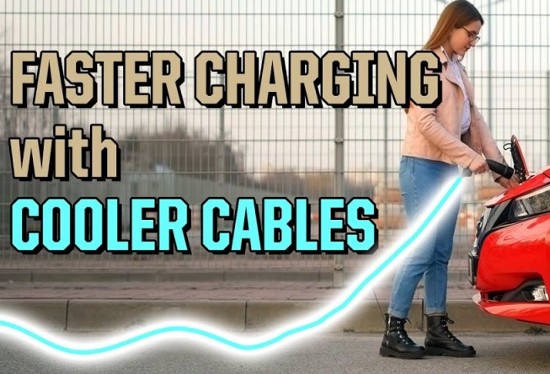The challenge of achieving an answer to the question posed in the above headline has been one that engineers at Purdue University in Indiana have taken on. In an alliance with the Ford Motor Company, they have invented a cable that can recharge an EV in the same amount of time it takes to fill a gas tank.
The trick to fast charging is the voltage carrying capacity of the medium being used to recharge. Cables currently specified for use by EV manufacturers require between 20 minutes (fast charging stations) to hours depending on the type of charge station such as those installed in homes.
A byproduct of putting more charge through a cable is excess heat. Purdue’s team of engineers has been working on removing the heat by using coolants built around the charging wire within the cable. The trick has been to come up with a solution that is not bulky making it difficult for an EV owner to use.
The prototype patent-pending solution is a thin-wire charging cable that uses a liquid-to-vapour cooling wrapper around it and that is capable of accommodating a current of up to 2,400 amperes. Amperes are the common measure for rating electricity going through a wire.
The 2,400 exceeds the 1,400-ampere minimum needed by EVs to reduce charging times to five minutes. Compare that to current charging cable technology which can handle up to 520 amperes with most chargers at 150 amperes or less. Batteries and charging stations will have to be rated to 2,500 amperes before this technology goes commercial. If you are interested you can view a video describing the technology on YouTube.
In a press release issued by Purdue, Issam Mudawar, a professor of Mechanical Engineering whose laboratory has been the skunkworks for this new invention, states, “My lab specializes in coming up with solutions for situations where the amounts of heat that are produced are way beyond the capabilities of today’s technologies to remove.” His work with the Ford Motor Company may yield a commercial product within a few years, one that could be a game changer.
At Ford, Michael Degner, Senior Technical Leader, of research into advanced engineering noted that, “Ford is committed to making the transition to electrification easy. We are glad to work closely with Purdue’s research team, which has the potential to make electric vehicle and commercial fleet ownership even more appealing and accessible.”
The project speaks well of the ongoing creative innovation in collaborations between academia and the car industry to move away from internal combustion engine technology to EVs. Considering that it is Ford at the forefront of this transition is most interesting. In the company’s press release about the new cable, Ted Miller, Ford’s Manager of Electrification Subsystems and Power Supply Research states, “Ford has been actively involved in battery research and electric vehicles dating back to the days of Henry Ford and Thomas Edison.” And yet it was the Ford Motor Company’s early 20th-century fixation and standardization on vehicles using internal-combustion engine technology that killed one of its rivals at the time, the battery-powered electric car. And in choosing gasoline, a byproduct of the fossil fuel industry, Ford, to a great degree has contributed to the global warming we are all experiencing now.
















